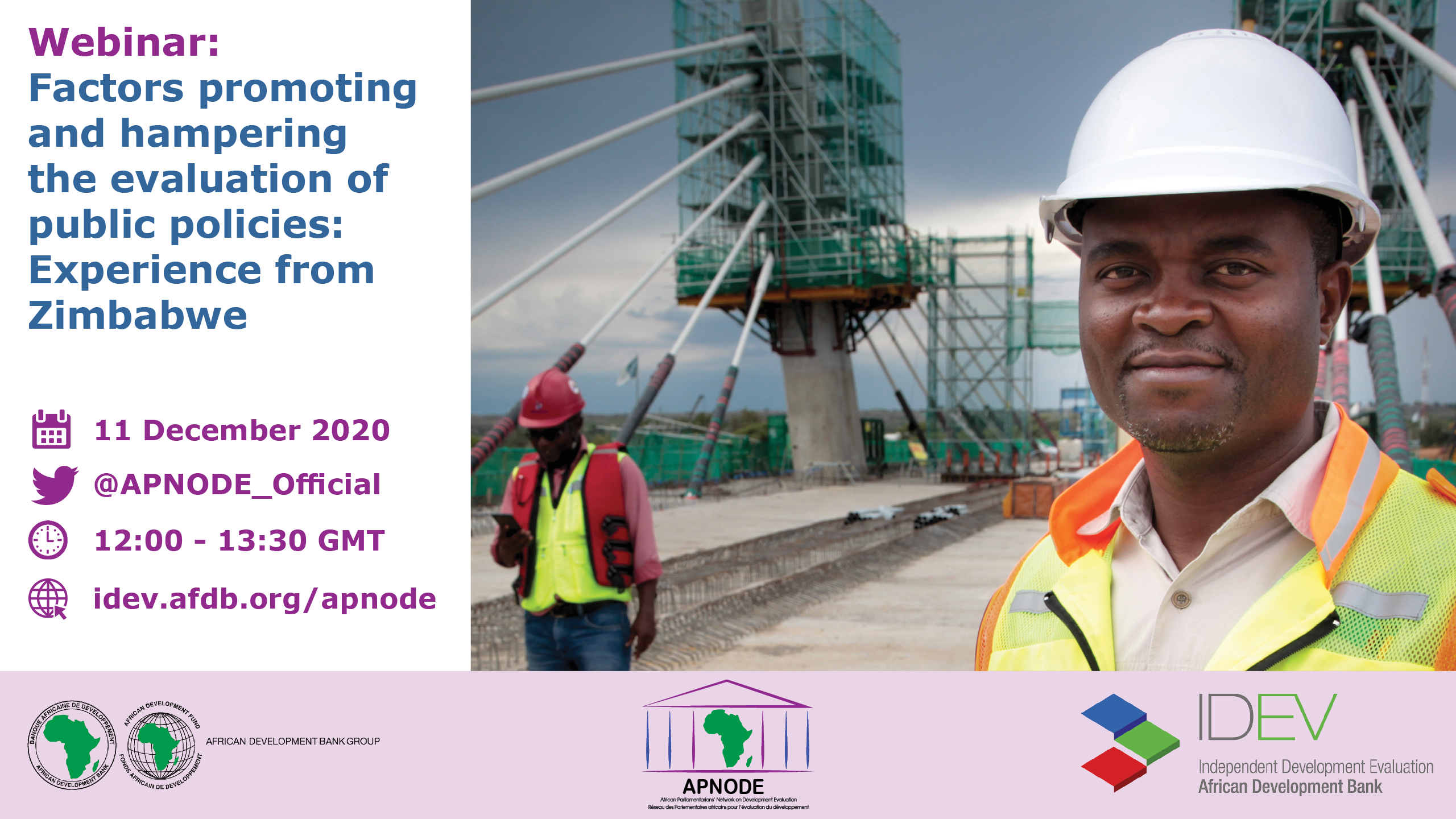
On 11 December 2020, the APNODE Secretariat delivered another insightful webinar themed ‘Factors promoting and hampering the evaluation of public policies: Experience from Zimbabwe’. Jointly organized with the APNODE Zimbabwe National Chapter, the learning event focused on the role evaluation plays in shaping public policies in Zimbabwe. It was an opportunity for Zimbabwean parliamentarians to highlight experiences with factors that have influenced the uptake of utilizing evaluation to shape public policies.
The panelists, Hon. Felix. Mhona, Treasurer of APNODE Zimbabwe, and Sen. Langton Chikukwa, Chairperson of APNODE Zimbabwe, shared thoughts on how evaluation has been utilized to inform public policies in the Zimbabwe National Assembly as well as within the Senate.
Hon. Mhona, in his intervention, noted that the “issue of evaluation has been taken seriously at the Parliament of Zimbabwe and by the President of the National Assembly, Hon. Adv. Jacob Mudenda, who is a champion in terms of advocating for monitoring and evaluation (M&E) at the National Assembly”. Sen. Chikukwa concurred with Hon. Mhona and noted that the Senate is also going in the same direction as the National Assembly. He pointed out that “concerning M&E, Zimbabwe is speaking with one voice, parliamentarians are seeing the benefits of M&E and both chambers are showing a level of maturity in their debates on the different programs and projects”.
Hon. Mhona further added that “Members of Parliament (MPs) can actively demand accountability from the Executive regarding the implementation and application of public policies as they (the MPs) need to give feedback to the people who have voted them in.” To this end, Members of Parliament in Zimbabwe recognize that the evaluation of public policy is important in assessing the impact of projects on the population and providing accountability for the budget that has been used and the resources invested. Panelists further reminded the audience that, in Zimbabwe, there are M&E commissions and structures within both the Executive and the legislative branches, all of which have played a huge role in the development of an evaluation culture within the country.
Both panelists highlighted the invaluable role APNODE has played in building an evaluation culture within the National Assembly of Zimbabwe, and noted that learning events and trainings provided by APNODE have been very instrumental in developing the capacity of MPs and strengthening the position of the APNODE Zimbabwe National Chapter. They further affirmed that today, evaluation is cross-cutting within MDAs (ministries, departments and agencies) in Zimbabwe. More importantly, Hon. Mhona and Sen Chikukwa both confirmed that the Office of the President has embraced and bought into the need for and utilization of evaluation in shaping public policies in Zimbabwe.
The panelists reiterated that given that value placed on evaluation, discussions with parliamentary committees are carried out in a bi-partisan manner to ensure that what’s best for the citizenry, rather than party affiliation, drives the agenda. This development, Hon. Mhona noted, was because all MPs across the board appreciated the value of evaluation.
During the question and answer session, APNODE member from the Democratic Republic of Congo (DRC), Germain Mbav Yav sought to find out what specific public policy evaluations had been conducted by the Zimbabwean Parliament. Speakers highlighted the evaluation of the Transitional Stabilization Program that is ongoing; the review of the agricultural and gender programs; as well as the environmental policy – as good examples in this regard. The ongoing evolution and utilization of evaluation by the Zimbabwean parliament was commended by Mbav Yav, who suggested that Zimbabwe’s experiences should be an example that other African countries could emulate.
The event attracted participants including MPs from across continent. Notable among the attendees was Hon. Elise Pokossy Doumbe, APNODE Executive Committee member from Cameroon, and President of the Cameroon National Chapter of APNODE.

